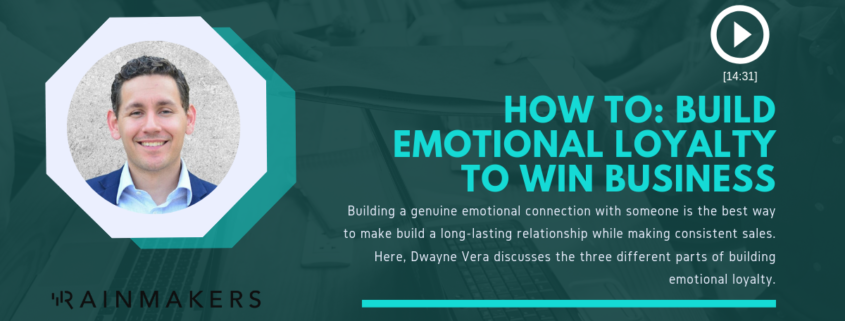[Sales Class] Building Emotional Loyalty to Win Business with Dwayne Vera
The traditional customer journey that has been taught for years has changed. Nowadays, customers receive more information from more sources than ever, and getting our voice heard among them is becoming harder and harder.
Creating successful customer experiences is what will lead you to overall and individual sales success. Here’s how Dwayne Vera believes you can do that:
Understand Your Ideal Customer
Understand and know your ideal customer, or ideal customer profile (ICP), and focus on building an emotional connection with them as well as their ICP as a whole.
Many of the sales that are being made today are emotional. Dwayne explains that our brains typically make decisions emotionally first and logically second, and often times the logic is there to support the initial emotional decision.
Because of this, we want to build emotional loyalty and cross the bridge of both emotion and logic to help sell a product. How you build that emotional bond will depend on the personality of the client and what personal connections you can uncover between you and the other parties.
By making this connection you not only increase your chances of making a sale, you create a solid foundation for a rich, long-lasting relationship with them.
Specific Information for Specific Milestones
Looking at information milestones
Depending on where the customer finds you and what information they are looking for, it will reveal what’s important to them and what their mindset is. For example, did they go straight to the pricing page, or did they go to a specific feature to learn more about your capabilities? When you know what their first priority is, you can angle the conversation to focus on what’s important to them.
“Gamifying” the sales process
This is a “when this, then that” information attitude. Instead of over-explaining your entire proposal from the very start, set up information milestones. Tell them certain information only when the conversation gets to certain points, and this will keep them interested and engaged as they go down the information pathway and along the sales process.
Systemize Your Referrals
Referrals are the best source of business. If someone that trusts your client gets referred to you by them, the likelihood of them being excited about working with you and actually following through with getting in contact is much higher.
To encourage high-quality referrals, ask some of your best clients if they are part of any associations, chambers, or groups of like-minded individuals. Try to tap into those communities and ask if they could refer you to their peers and colleagues. Your client can act somewhat like a real-life case study and be a valuable resource when it comes to promoting your product or service and getting new leads.
Video testimonials
Video testimonials are another powerful way to make an emotional connection to prospects. To set up a process of creating video testimonials, make a video testimonial “ask” as you get close to closing deals with new or existing clients. If they are comfortable being a part of a video or audio testimonial then you get a bonus asset out of the deal, and if they don’t want to be a part of it then you can continue on with the existing negotiations.
Testimonials can be brief but powerful, Dwayne explains, and offers three simple example questions:
- What feature made you purchase this product
- What did you like most about working with me?
- How do you think this product will benefit you in the future
Conclusion
By getting to know your ICP, building an emotional connection with the individuals you are targeting, leading them down an information-based journey, setting up a system of referrals, and implementing video testimonials, you will maximize your potential to close more deals as well as build deep, long-lasting relationships with your clients.




